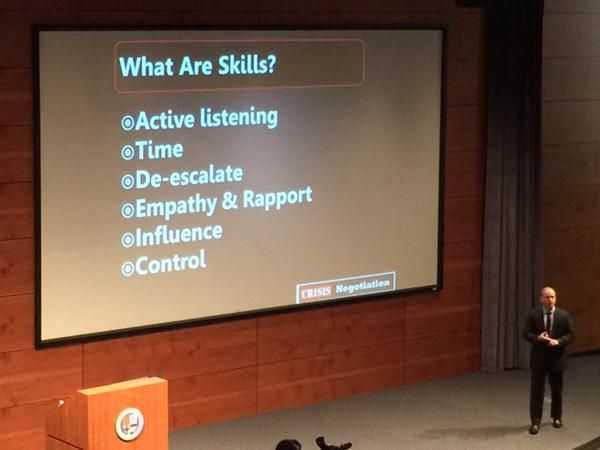The 5 Core Skills Of Hostage Negotiators
Curated from: psychologytoday.com
Ideas, facts & insights covering these topics:
8 ideas
·6.72K reads
36
Explore the World's Best Ideas
Join today and uncover 100+ curated journeys from 50+ topics. Unlock access to our mobile app with extensive features.
“In crisis situations, emotions can dictate a person’s actions at the detriment of rational thinking.”
JEFF THOMPSON
240
1.89K reads
"We all need to be good listeners and learn to demonstrate our empathy and understanding of the problems, needs, and issues of others. Only then can we hope to influence their behavior in a positive way.”
GARY NOESNER
251
676 reads
The Goal In Law Enforcement Hostage Crisis Situations
To use communication skills to get a person to change from a negative behavior to a more desirable one.
207
754 reads
A Negotiator's Goals During Crisis Management
In crisis situations a person’s actions is heavily based on emotions, at the expense of rationality. A negotiator seeks to reduce the negative emotions and bring back a more rational thinking process through the use of active listening, timing, empathy, rapport building, influence and control.
242
653 reads
Core Skill 1: Active Listening
By strategically using open-ended questions, emotional labeling, mirroring/reflecting, silence, and paraphrasing, active listening allows the negotiator to gather information on the other person and simultaneously demonstrate empathy and rapport, thus reducing their negative emotions.
259
700 reads
Core Skills 2 & 3: Empathy and Rapport
To influence someone it's necessary to show an understanding of their current emotions and behaviors; to have empathy. This can be done by attentively listening.
Building rapport involves giving the person your attention, being positive and ensuring verbal and nonverbal communication are congruent.
257
672 reads
Control In Crisis Negotiations
People in crisis often feel they lack control. By letting them talk and being a part of the negotiation process you give them a sense of control, helping them de-escalate and bringing yourself closer to your goal; voluntary compliance.
You also have to keep control of yourself, especially your emotions, as negative displays of emotion by you can escalate the situation.
251
601 reads
Influence In Crisis Negotiations
After using the other crisis negotiations skills you can pursue the final goal, to nudge someone else’s frame of mind towards a positive outcome.
231
780 reads
IDEAS CURATED BY
Creator. Unapologetic student. Lifelong coffee ninja. Internet nerd. Bacon lover.
Valentina D.'s ideas are part of this journey:
Learn more about communication with this collection
How to showcase your skills and experience
How to answer common interview questions
How to make a good first impression
Related collections
Similar ideas
3 ideas
Police Negotiation Techniques from the NYPD
pon.harvard.edu
2 ideas
Read & Learn
20x Faster
without
deepstash
with
deepstash
with
deepstash
Personalized microlearning
—
100+ Learning Journeys
—
Access to 200,000+ ideas
—
Access to the mobile app
—
Unlimited idea saving
—
—
Unlimited history
—
—
Unlimited listening to ideas
—
—
Downloading & offline access
—
—
Supercharge your mind with one idea per day
Enter your email and spend 1 minute every day to learn something new.
I agree to receive email updates



